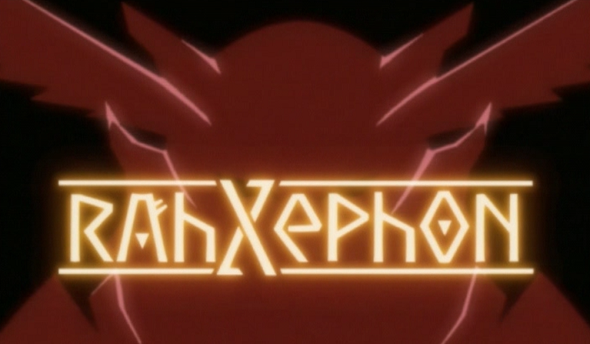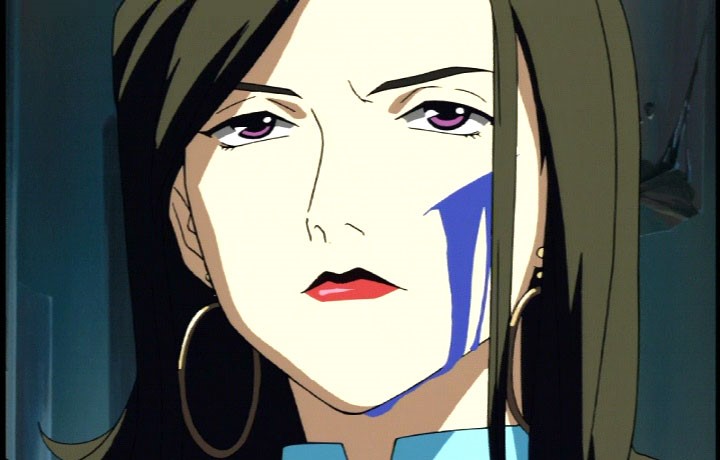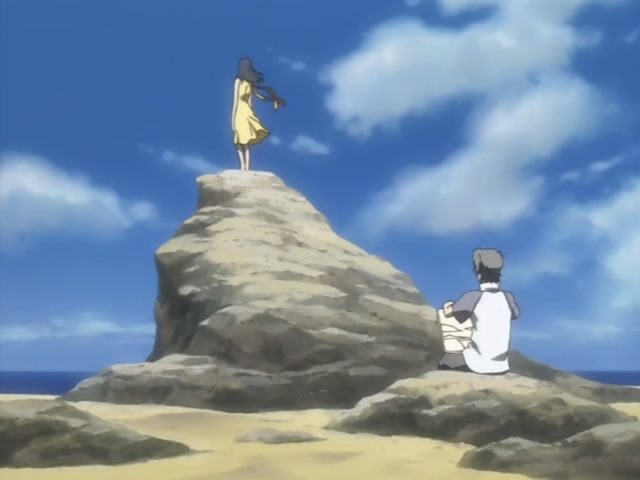 I wasn’t really going to touch on anime over here, but then I yakked about Robotech and Macross for more than a month and you guys seemed to respond well to it. So I’ve decided that touching on some other anime series might not go amiss, and now you’re all in for it.
I wasn’t really going to touch on anime over here, but then I yakked about Robotech and Macross for more than a month and you guys seemed to respond well to it. So I’ve decided that touching on some other anime series might not go amiss, and now you’re all in for it.
I will make no secret of the fact that I’m kind of fond of giant robots. There’s something about them that appeals to me, and I’m not ashamed to suggest that it might just be the absurd amount of weapons that they tend to carry. But in the last twenty years or so, starting with Neon Genesis Evangelion, some folks have started to look at the giant robot shows they grew up with and addressed them with a more critical eye. Evangelion was something of a deconstruction and sought to answer questions like “Why would you give ultimate power to someone as unstable as a teenager?” Over here in the US, Pacific Rim was Guillermo del Toro’s love letter to giant robot shows. 2002’s underappreciated RahXephon is probably somewhere in between the two. It lacks the cynicism of Evangelion but is more keen on playing with the tropes of the super robot genre than Pacific Rim was. If you asked Gene Wolfe to pen a giant robot show, I feel like it would look a lot like RahXephon.
RahXephon follows Ayato Kamina, a highschool student and artist, in a Tokyo that no longer has any contact with the outside world. Everything but Tokyo vanished a few years before the series began, and the people since then have lived in utter isolation– until, one day, strange fighter planes appear in Tokyo’s skies, and machines stranger still appear to fight them. In the ensuing chaos, Ayato runs afoul of government agents who shed blue blood, meets a beautiful classmate who is largely unconcerned with the chaos, and runs into a mysterious woman, Haruka Shitou, who claims she can show Ayato the truth about the world. Finally, Ayato finds a strange, underground shrine full of bright blue sky containing an embryonic giant “robot,” the RahXephon, that responds to him and him alone. A battle with the strange machines defending Tokyo ensues, and in the aftermath, Ayato and Haruka find themselves in the outside world.
It wasn’t the world that disappeared; something mysteriously walled off Tokyo behind a dimensional barrier. Inside of it, time flows more slowly, and what has been a few years inside has been a decade or two outside. Haruka is an agent working for TERRA, an organization intending to unravel the mystery of the barrier (called “Tokyo Jupiter” because of its appearance), and the RahXephon might just be the key to that mystery that they’re looking for.
 RahXephon is sometimes unfavorably compared to Evangelion, and to be honest, I can see why that would be the knee jerk reaction. Ayato and shares a few similarities with Evangelion’s Shinji Ikari, particularly in the parental area; the woman that Ayato has known as his mother for all this time is revealed early on to have blue blood, like the agents who were chasing him, and the shock of finding out that she is something besides who he thought she was embitters him. Like Shinji, Ayato can be passive and is frequently manipulated. Like Shinji, Ayato is at the center of a web of awkward web of relationships. There are a few similarities in plot, but much of that really boils down to the old school giant robot shows that are in both their DNA. But where relationships in Evangelion are probably best described as “unhealthy” or “sick,” most of the awkward relationships in RahXephon are just damaged. (To be fair, there are still some really warped relationships in the periphery.) Whereas Shinji is whiny and passive aggressive, Ayato learns to be a man and make choices for himself. It’s like someone took Evangelion‘s subversion and subverted it. Dare I say…. superverted it? 😉
RahXephon is sometimes unfavorably compared to Evangelion, and to be honest, I can see why that would be the knee jerk reaction. Ayato and shares a few similarities with Evangelion’s Shinji Ikari, particularly in the parental area; the woman that Ayato has known as his mother for all this time is revealed early on to have blue blood, like the agents who were chasing him, and the shock of finding out that she is something besides who he thought she was embitters him. Like Shinji, Ayato can be passive and is frequently manipulated. Like Shinji, Ayato is at the center of a web of awkward web of relationships. There are a few similarities in plot, but much of that really boils down to the old school giant robot shows that are in both their DNA. But where relationships in Evangelion are probably best described as “unhealthy” or “sick,” most of the awkward relationships in RahXephon are just damaged. (To be fair, there are still some really warped relationships in the periphery.) Whereas Shinji is whiny and passive aggressive, Ayato learns to be a man and make choices for himself. It’s like someone took Evangelion‘s subversion and subverted it. Dare I say…. superverted it? 😉
 Where Eva is flashy, RahXephon is gentle. Eva is painted in sharp, bright colors; RahXephon in softer, gentler colors. Eva‘s characters are frequently aggressive and defined by their issues; RahXephon‘s characters actually grow into real people. The mysteries of Evangelion are murky, cynical, and impenetrable; the mysteries of RahXephon unfold in a way that requires some thought and rewards repeated exposure, but in such a way as to give you a coherent story when all is said and done. RahXephon, by and large, does not wallow in despair the way Evangelion does, and doesn’t act like it has an artsy axe to grind. It honestly, as I mentioned before, makes me think of the kind of show that Gene Wolfe would write if Gene Wolfe wrote anime shows. Even when all is said and done, when you’ve watched the whole series five or six times and have a pretty good grasp on most of the show’s mysteries, there are still lingering mysteries in the back of your mind– but in a good way. Not to beat the Evangelion horse to death, but it’s not a show that leaves you scratching your head. It’s a show that leaves you daydreaming about the world it takes place in.
Where Eva is flashy, RahXephon is gentle. Eva is painted in sharp, bright colors; RahXephon in softer, gentler colors. Eva‘s characters are frequently aggressive and defined by their issues; RahXephon‘s characters actually grow into real people. The mysteries of Evangelion are murky, cynical, and impenetrable; the mysteries of RahXephon unfold in a way that requires some thought and rewards repeated exposure, but in such a way as to give you a coherent story when all is said and done. RahXephon, by and large, does not wallow in despair the way Evangelion does, and doesn’t act like it has an artsy axe to grind. It honestly, as I mentioned before, makes me think of the kind of show that Gene Wolfe would write if Gene Wolfe wrote anime shows. Even when all is said and done, when you’ve watched the whole series five or six times and have a pretty good grasp on most of the show’s mysteries, there are still lingering mysteries in the back of your mind– but in a good way. Not to beat the Evangelion horse to death, but it’s not a show that leaves you scratching your head. It’s a show that leaves you daydreaming about the world it takes place in.
All this is not to say that there’s no action and everything is pleasant. RahXephon isn’t afraid of brutality, but it leverages it far more effectively than most shows do. There’s an episode late in the series, in particular, that takes the monster of the week sort of format (which the show does have for the first half dozen episodes or so, while it is establishing characters) and makes it into something immensely heartbreaking. Ayato and the RahXephon are doing what they are meant to do– defend innocents– but all that goes horribly wrong in a way that will effect Ayato for the rest of the show. Like most installments of Macross, RahXephon has wonderful characters that feel like living, breathing people, and it knows how to use them– to make you happy and to break your heart.
If it sounds like I’m gushing about this show, well… I am. I watched it fansubbed soon after it aired and, while it didn’t quite have the impact that Robotech/Macross did (I mean, I was into my twenties by then) it definitely became a show that I still count among my influences. I think a lot of my love stems from the show’s superversive qualities; it’s a show that’s okay with decent people doing heroic things because they’re the right thing to do. It’s okay with showing a sense of wonder without irony.
And it’s available on Hulu and Amazon Prime Streaming.
Being cynical about cynicism. Superversive. Me like this idea.
I’m surprised you didn’t mention the soundtrack for the show, which was scored by Ichiko Hashimoto, a jazz musician/singer who also voiced the role of the mother as well as sang the ending song. Not sure if she ever did any other roles, but I remember her voice being very different from the typical anime voice acting.
Sorry I know I am dating myself but the original giant robot series is still the best for me Johnny Socko!
Talk about a kid in control.
I know it’s not anime but it was still good.